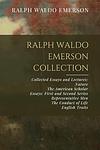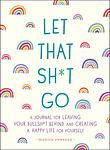Ralph Waldo Emerson
Ralph Waldo Emerson was an American essayist, lecturer, philosopher, and poet who led the transcendentalist movement of the mid-19th century. He was seen as a champion of individualism and a prescient critic of the countervailing pressures of society. Emerson is best known for his essays, particularly 'Nature' and 'Self-Reliance'.
Books
This list of books are ONLY the books that have been ranked on the lists that are aggregated on this site. This is not a comprehensive list of all books by this author.
-
1. The Essential Writings of Ralph Waldo Emerson
This book is a comprehensive collection of works by a renowned American philosopher and poet. It includes his most influential essays, lectures, and poetry, providing readers with a deep insight into his thoughts on nature, self-reliance, love, friendship, freedom, and the importance of intellectual independence. The book serves as a guide to the author's transcendental philosophy and his belief in individualism, nonconformity, and the inherent goodness of man and nature.
-
2. On Self Reliance
This philosophical essay champions the virtues of individualism and personal integrity, arguing that true self-reliance involves trusting oneself and embracing one's inner voice amidst societal pressures and external influences. The author posits that self-reliance is not only essential for personal growth and fulfillment but also for the development of a robust, independent society. Through a series of compelling arguments and reflections, the essay encourages readers to cultivate their own beliefs and values, to be self-sufficient in thought and action, and to recognize the inherent power and potential within themselves, free from the constraints of conformity and societal expectations.
-
3. Essays, First And Second Series
This collection is a compilation of insightful and thought-provoking essays that delve into the nature of the human experience, exploring themes such as individuality, nature, society, and spirituality. The author, a central figure in the transcendentalist movement, encourages readers to break free from the constraints of conformity and to trust in their own intuition and inner moral compass. Through a blend of personal reflection and philosophical musings, the essays challenge the status quo and advocate for a life of self-reliance, intellectual independence, and a deep connection with the natural world. The work has had a lasting impact on American thought and literature, inspiring readers to seek a more authentic and fulfilling existence.
-
4. Poems Of Ralph Waldo Emerson
This collection brings together a rich tapestry of verse from one of the 19th century's most influential American poets and thinkers, offering readers a profound exploration of the human spirit, nature, and philosophy. The poems delve into themes of individualism, transcendentalism, and the quest for personal growth, showcasing the author's lyrical prowess and his commitment to a deeply introspective and optimistic view of life. Through his poetry, the author invites us to consider the intimate connection between humanity and the natural world, as well as the power of the self-reliant individual.
-
5. Nature
The book in question is a seminal essay that lays the foundation for transcendentalist philosophy, exploring the intrinsic relationship between humans and the natural world. It presents nature as a divine creation that serves as a source of inspiration and wisdom, accessible through personal intuition and reflection. The author argues that by engaging with nature, individuals can transcend the limitations of the material world and connect with the universal spirit. The essay also discusses the importance of individualism and the role of nature in fostering a sense of freedom and spiritual growth, ultimately advocating for a harmonious coexistence between humanity and the environment.
-
6. Representative Men
The book in question is a collection of seven essays that delve into the biographical sketches and philosophical musings on the nature of great individuals who have shaped history. The author explores the characteristics and influence of different archetypal figures, including the philosopher, the mystic, the skeptic, the poet, the man of the world, and the writer. Through these portraits, the author examines the relationship between the individual and society, and the universal truths that can be gleaned from the lives and works of these eminent personalities. The work is a reflection on how these "representative men" embody and transmit the intellectual and moral qualities that define leadership and genius.
-
7. The Conduct Of Life
"The Conduct of Life" is a collection of essays that delve into the philosophical exploration of human existence, examining the ways in which individuals navigate the complexities of life. The work discusses the interplay of fate and freedom, the importance of cultivating personal virtues, and the pursuit of self-reliance and individualism. It emphasizes the significance of aligning one's actions with universal laws and truths, and it encourages readers to live with intention, harness their inner potential, and contribute positively to society. Through a blend of personal reflection and universal wisdom, the essays offer guidance on leading a purposeful and ethical life.
-
8. Journals
The book is a collection of personal reflections, observations, and philosophical musings penned over several decades by a prominent American thinker. It offers an intimate look into the author's intellectual journey, ethical convictions, and the development of his ideas on individuality, nature, and transcendence. The entries range from everyday occurrences to profound insights on human nature and society, providing readers with a deep understanding of the author's influence on American literature and transcendentalist thought. Through these pages, the author's voice emerges as a guiding force in the exploration of self-reliance and the pursuit of truth.







